I feel a bit at war with my body recently. I love it naked, and I don’t love it in clothes.
My boyfriend and I recently went on a tropical getaway to Bali. I pulled out my box of summer dresses and chose my favourites to take with me. The pistachio green maxi with the cut-outs, the cream Japanese silk I stole from my mum’s wardrobe many moons ago, the floral halterneck I wore to death in Europe last year. All my tried-and-tested go-to’s.
I was worried in the lead-up to our trip, knowing that I hadn’t been feeling great in my body—and that being somewhere warm requires minimal clothing, which means fewer opportunities to hide. Hence, the careful selection of dresses I know and love, that have seen me through difficult body image eras of years past.
But to my dismay, as I pulled on one after the other on our first night in Bali, I discovered that none of them were having their usual impact on my mood. Instead of feeling comfortable, sexy, myself—I felt all wrong. The material of each seemed to grip to me in the wrong places. I was aware of my curvaceous hips and lower stomach fat, the extra weight in my boobs and under my arms. I felt claustrophobic in each dress, like I wanted to tear it off as soon as I’d put it on.
I’d assumed that my feelings about my body had something to do with the winter weather in Melbourne, the drag of the every day routine, the comfort of being in a loving relationship. I’d thought that a holiday in a warm place would lift the mental fog and help me feel good in my body again. But it didn’t.
I ended up wearing a different coordination of black each night. A loose black jumpsuit. A black singlet with a black stretchy maxi skirt. The pieces I felt the most comfortable in were the ones that didn’t sit tightly on my body, that allowed me to forget about how my body moves when I walk, expands as I sit, changes shape and texture with each surface it touches.
I haven’t felt this way about my body in years. I’ve done a lot of work not to. As a writer and a woman, I’ve always been open about my struggle to grow into my curves. I’ve written article after article about them for big publications, sharing my insecurities with the internet as a step towards changing the narrative about female bodies that deviate from the thin ideal.
And in so many ways, I’ve succeeded at celebrating my body as it is. So much so, that it feels hard to admit that I’m currently carrying the negative inner monologue I’ve tried so vehemently to unlearn.
Because I think we fluctuate so much as women. Our hormones, our moods, and our bodies are deeply linked to our minds. We’ve never been taught much about how our bodies work, because Western science and medicine have never prioritised it—thanks to the patriarchal hierarchy that still governs much of society. Never mind that women are the vessels that bring life into this world—we still call a hysterectomy by its original name, a nod to the time when removing a woman’s womb was seen as a cure for being hysterical.
Rather than educating women on the connection between their womb and the pain, trauma, and stress we so often hold there, medicine removed it—out of sight, out of mind—acting as a stark metaphor for how women’s bodies continue to be treated and spoken about in a society that would rather stick bandaids over potholes than address what created them.
It therefore seems so clear to me why I hold such shame in my body. Especially in the moments where I feel that it doesn’t fit into the picture perfect frame that affords me thin privilege. That instead of feeling empathy and understanding for the physical changes in my body that come with age, relationships and natural cycles, it feels much more instinctive to condemn it. To eat less, exercise more and find clothes that make me look and feel thinner.
And that makes me feel guilty. Because why should I take it upon myself to worry about my position of value in the world, simply due to how much fat I carry on my body? Shouldn’t being healthy be the only thing that matters?
I think the thinness plastered across my social feeds is getting to me more than I realised. I really thought I was past all that—comparing myself to other people’s bodies, feeling tethered to a universal ideal, wishing to inhabit a shape that isn’t my own.
I went through the thinnest stage of my adult life after I broke up with my ex boyfriend, two and a half years ago. I ended things, and sooner after, I lost my Nonno and was made redundant from my job. I wasn’t trying to lose weight, but the stress, sadness and upheaval hit me all at once—and it showed in my body. And although it was one of the most disorientating periods of my life, I’d never received so many compliments. People told me I looked “so well!”, “great”, “more like myself”—almost everywhere I went. And while part of me resented how my thinness was being celebrated at the expense of how I was actually feeling on the inside, another part of me felt accomplished. Like I’d made it, somehow? Just by shrinking.
That time changed my relationship with my body. Suddenly, I knew what it felt like to be treated as a thinner person—and I couldn’t deny the shift in how I was being perceived. I liked the way people looked at me, prioritised me. I liked being able to walk into a store and find clothes that fit with ease. I felt more comfortable in form-fitting pieces, in trying on trends, in showing my midriff.
It gave me something to compare my body at other stages of my life to, like the stage I’m in now. I can’t shake the feeling that putting on weight—that changing shape—feels like going backwards. Even though I don’t logically believe that, there’s something deep inside of me that does. I can feel the thought cross my mind before I’ve had a change to swat it away.
Kristen Stewart recently said, “Being a woman is a violent experience.” And it is.
“Being a woman really can feel like being a public commodity. Every place you go, it’s just a given that people are going to assign you a value based on whether they would fuck you, and will treat you accordingly. It doesn’t matter who you are, what you do, what you use your voice to say, your body is always part of the conversation.”
And that’s just it. Our bodies are always part of the conversation, even when no words are being exchanged. We’re always being watched, measured, interpreted. Encouraged to be sexy, then punished for the very thing we were told would make us powerful. You’re either Madonna or whore. But what if you’re neither—or both?
We’re told to be sexual, but only if that sexuality stays within the confines of male desire. Show too much skin, and you’re asking for it. Show too little, and you’re a prude. Put your boobs away. Tuck in your stomach. Don’t let your hips take up too much space. Curves are erotic, fertile, womanly—until they threaten someone. And thinness? Thinness is praised because it reads as pure. Contained. More childlike, more compliant, less sexual unless invited.
It’s a system that teaches us not to trust our bodies—only how they’re perceived. You stop dressing for comfort or expression and start dressing for safety. For control. How will I best be received today? You ask, as you try on dress after dress until you feel as though how you look how other people want.
Even as a woman who has spent years trying to rewire her brain to see her body through the lens of all it carries her through, through her health and her true feelings about herself and her own beauty—I’m scared by how easy it is to revert to the narrative that society has carved out for us.
But you know what I find to be a relief in all of this? Being naked.
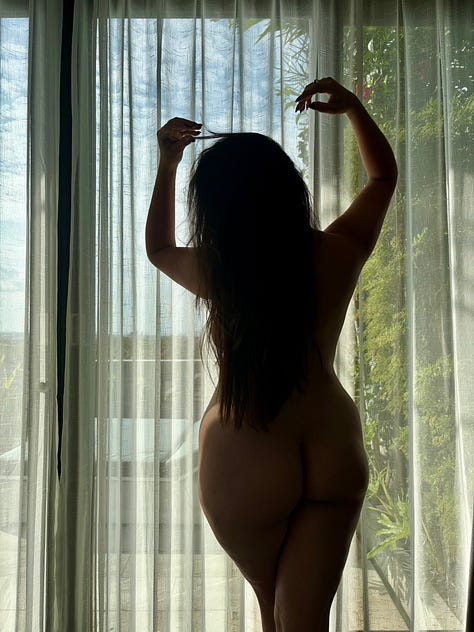
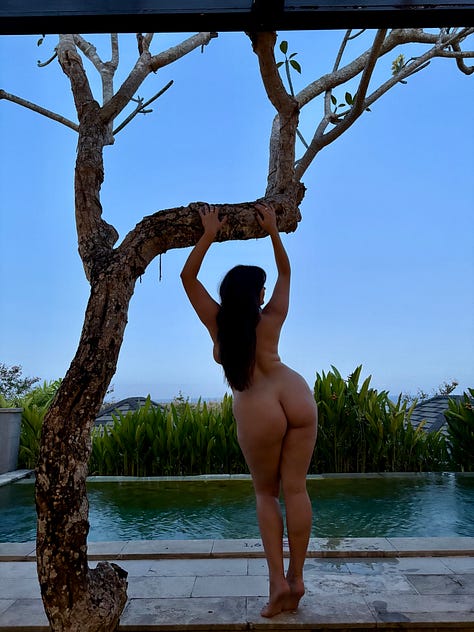
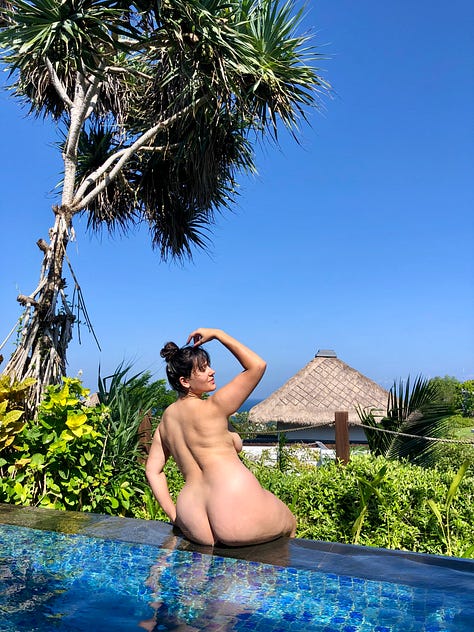
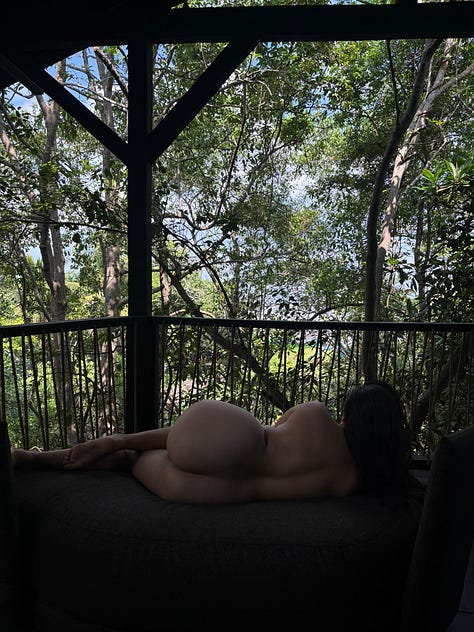
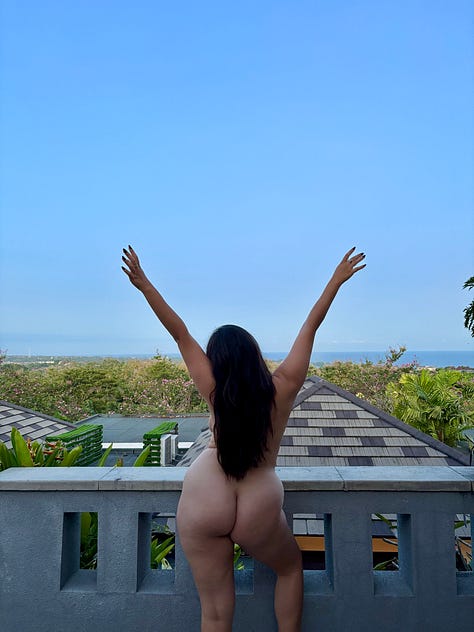
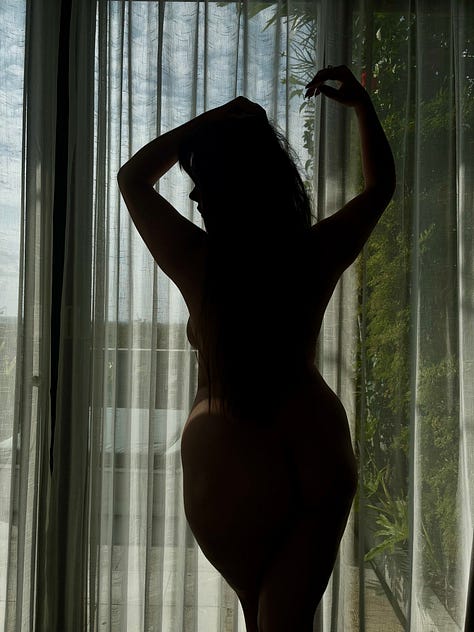
In nakedness, you’re not working within the confines of clothes, made by other people’s expectations of the female form. Being naked allows you to exist in your body the way it is. No elastic waistband trying to sinch you in, to create a shape. No underwire pressing into the soft part of your underarms to manufacture a certain kind of fullness, no tight material showcasing parts of your body that haven’t been accounted for—by society and it’s industries at large.
Being naked means that you don’t need it ‘fit in’ to anything. You can simply be.
I’ve always found it much easier to be naked than to wear clothes. Mostly, you’re only naked around people you know intimately, or when you’re alone. Both provide a safe space to exist, however you show up that day. Whether you’re bloated from eating gluten or heavy from your period, your body is simply your body and you’re existing within it.
Even in sex, I’ve found it a relief to be naked. On dates, for example, I’d feel more comfortable taking off my clothes in someone else’s bed than walking into the restaurant to meet them, wearing a carefully curated outfit. I think what it comes down to is the fact that I don’t actually have an issue with my body. When I look at myself in the mirror, naked, I love what I see. When I’m having sex, I never think about how my body looks on the outside—only how it feels.
But when I put on clothes that don’t fit quite right, I’m reminded of all the women who would slip into this silhouette perfectly—of how differently I might be treated if I could too, of the version of myself the world wants me to be, versus the version I actually am. And that makes me feel like I’ve failed.
I don’t think I’m alone in this. In fact, I know I’m not. I put up an Instagram story during my trip to Bali, confessing how I was feeling about my body naked vs. in clothing. Over 50 women liked it and messaged me to say they often feel the same.
I’m really starting to understand the quote, ‘Comparison is the thief of joy’. But how are we meant to feel good about ourselves—or even begin to understand how to exist within our own uniqueness—if we live in a world that’s built on constant comparison? I feel like I know too much, see too much, have too many versions of womanhood to measure myself against. I’m in my right mind to delete all forms of social media—except Substack, of course—and spend some time by myself, for real.
Maybe I don’t need to learn how to love my body all over again—maybe I already do. Maybe I just need to learn how to come back to it beneath all the noise. Some days, I don’t mind when my boobs are out, or when you can see the cellulite on my thighs as I sit. But other days, I want to hide my body from the world—to exist without being criticised or desired.
I don’t want to be Madonna, and I don’t want to be the whore. I don’t want to have to choose. To label myself for the comfort of others—whether it’s a man who wants to fuck me, or a shop assistant who can’t find my size.
I just want to be a woman in a body. One that expands and contracts with life. Stripped of performance. Stripped of shame. Sometimes stripped of clothes.
But never stripped of worth.





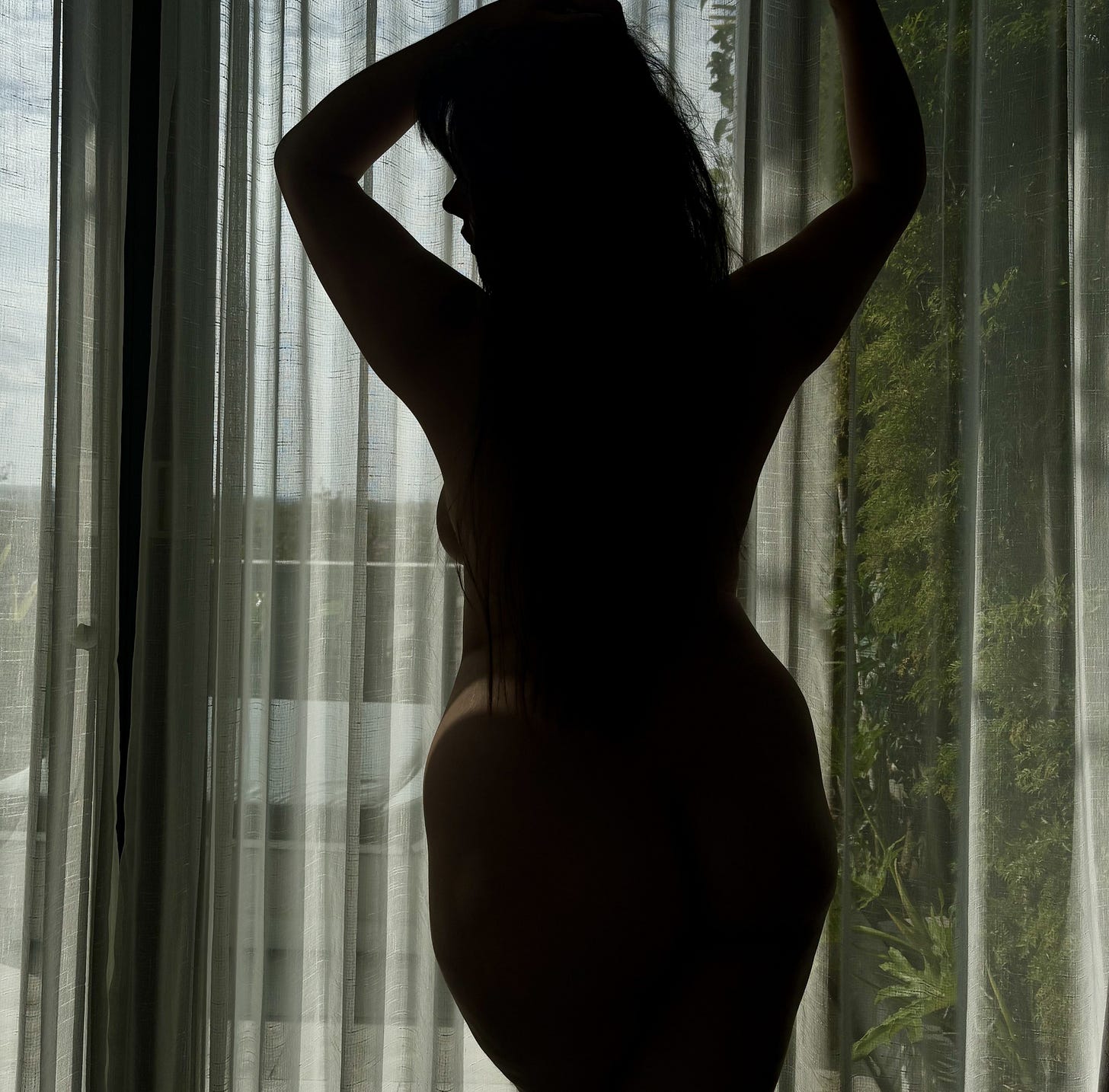
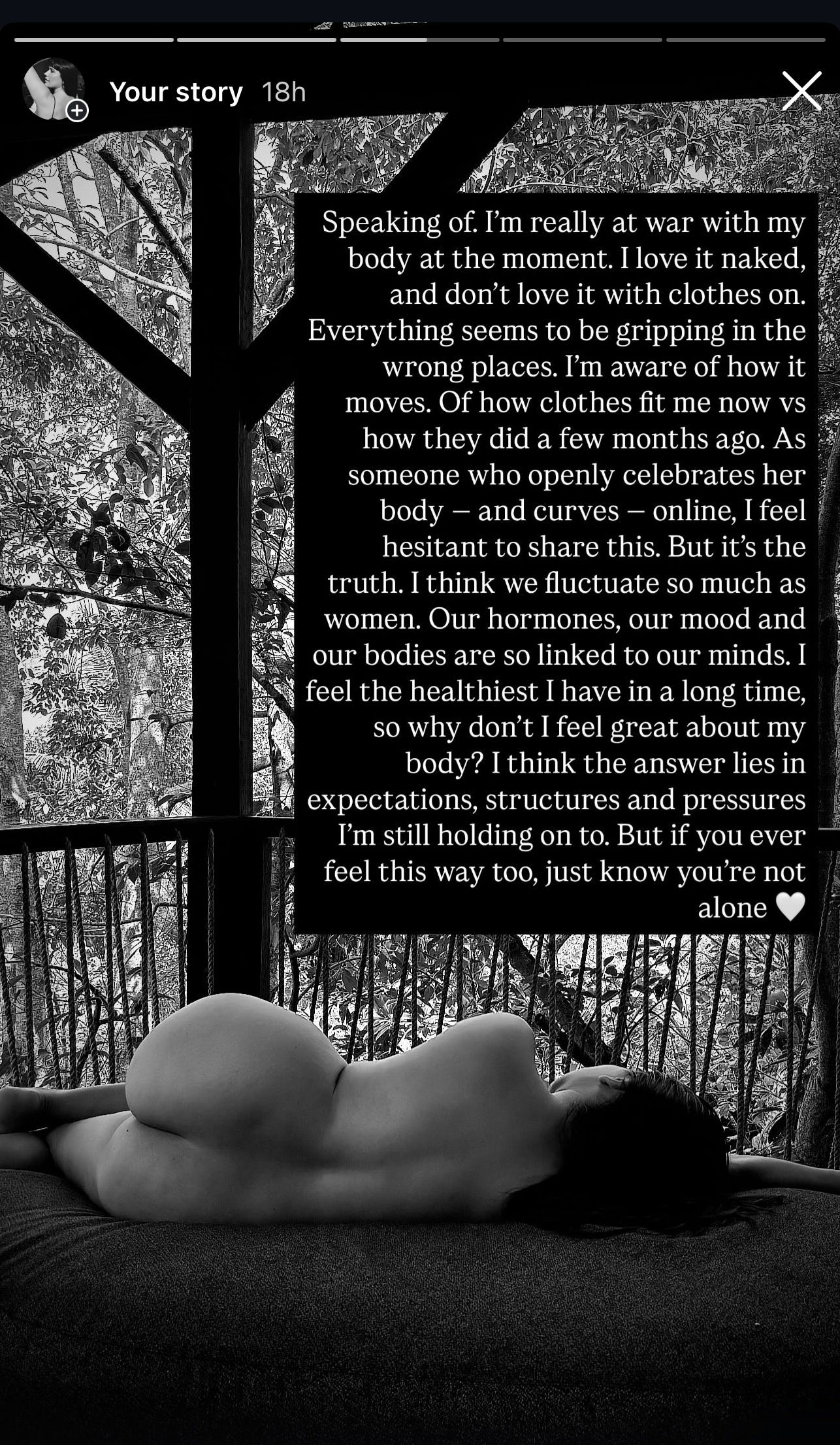
Stopped reading at "boyfriend."😐
Laura, this experience was beautifully written and captured. My wife has had similar experiences with her body. I have tried to suggest just be naked but she feels uncomfortable naked too. I love her body with all its beauty and curves.